EVERY music band has their own story of how they came together. What brought Route to Diomira (RTD) together was the book Invisible Cities.
It was an ordinary night in Beijing. While we were drinking Yanjing beer, which is a strong symbol of the city’s long past, and eating fresh soya beans at an open air restaurant with some friends, we suddenly discovered that everyone at the table had something in common: Each of us had read the book, Invisible Cities, by Italian writer Italo Calvio at a certain period in our lives and had been influenced by it.
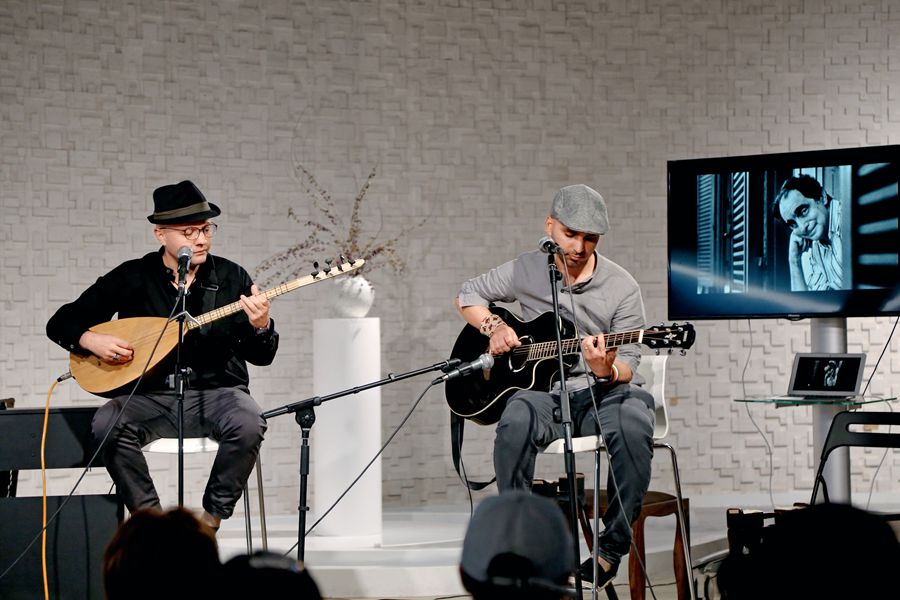
The band’s debut in Beijing.
We later made a plan to start a music group together with the friends who were interested in music and played an instrument. None of us were professional musicians, and so didn’t know where to start or how to create different ideas. The book gave us the inspiration.
Invisible Cities is based on imaginary dialogues between the Venetian traveler, Marco Polo, and Kublai Khan. After his conversations with the Khan, Marco Polo traveled through Khan’s country city by city. In the end, Khan carefully listened to the observations from what this foreign traveler had seen and heard.
How could we have been inspired by this book to form a band? Well, even though the story is fictional, it described the experience of a traveler passing through China. Moreover, the writer was inspired by the historical Silk Road when he wrote this novel. All RTD members come from different corners of historical Silk Road, Cenk and I come from Turkey, Massimo from Italy, Amir and Mahiar from Iran. All of us live in China and are traveling through its cities like the Venetian traveler did. In our China experience, we travel to various cities, meet people, and learn about their daily lives. Then one day we decided to express this experience through music.
Music Is Meant to Be on the Road
Diomira, the first part of the Invisible Cities, presented a name to our band and became the name of our first song. Calvino describes Diomira:
“Leaving there and proceeding for three days towards the east, you reach Diomira, a city with 60 silver domes, bronze statues of all the gods, streets paved with lead, a crystal theater, and a golden cock that crows each morning on a tower. All these beauties will already be familiar to the visitor, who has seen them in other cities. But the special quality of this city for the man who arrives there on a September evening, when the days are growing shorter and the multicolored lamps are hung all over the doors of the food stalls, and you can hear a woman’s cry from a terrace, is that he feels envy towards those who believe they have once lived an evening identical to this and think they were happy at that time.”
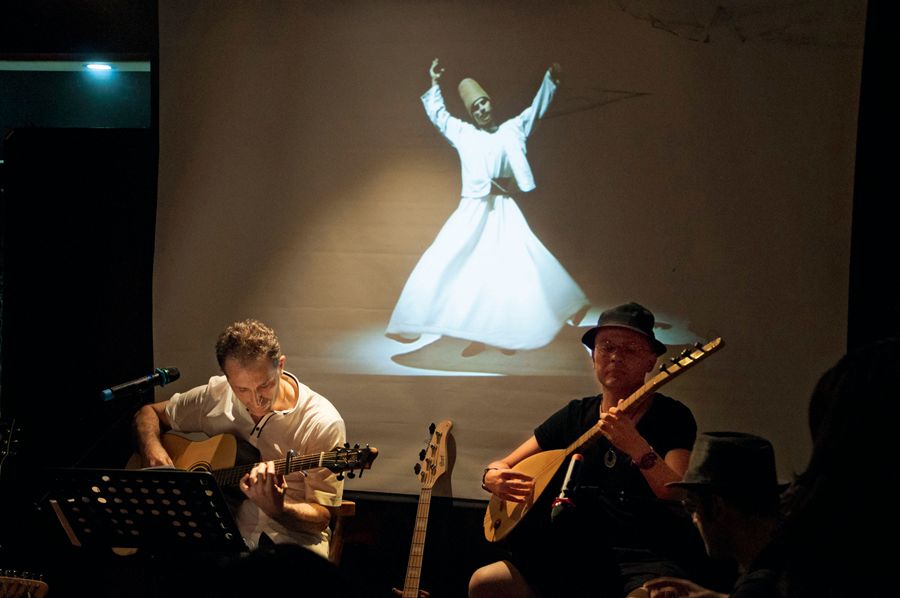
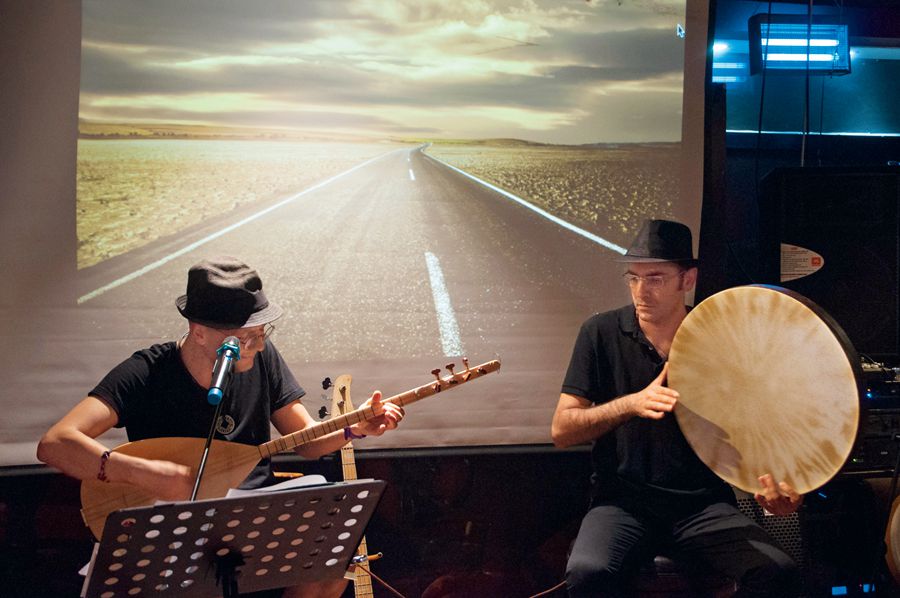
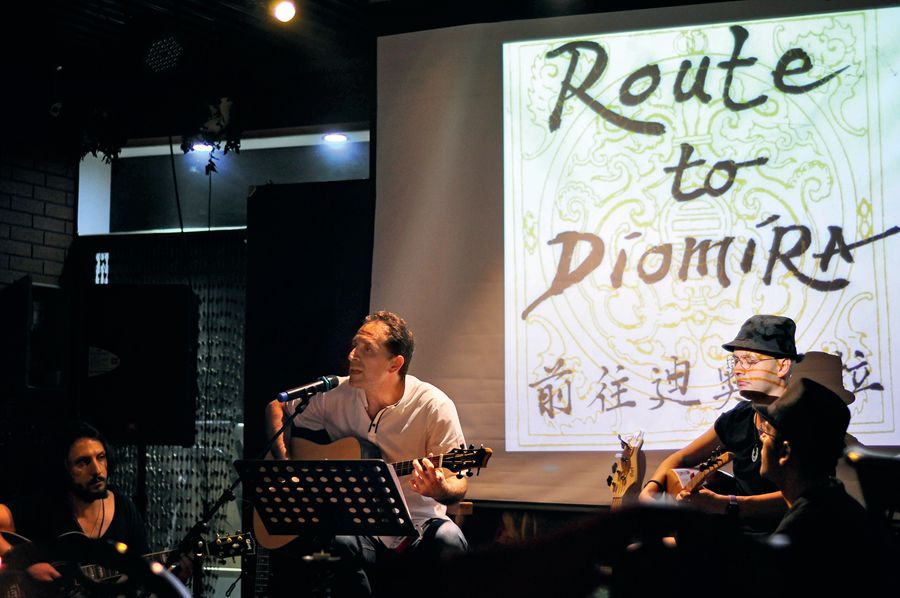
The band RTD is comprised of five music lovers who all play instruments out of pure passion.
Each of us contributed to this piece by combining what we felt while reading this passage of the book and the melodies we brought from our distant geography. Diomira, as the first song of our band, is a road song in this respect. It marks a never-ending journey. The purpose of this spiritual journey is not to arrive at a place, but rather the aim is to be on the road. Because, as a Turkish writer once said, the road educates a man. In the end, we thought it appropriate to call the band, Route to Diomira. This name was actually something that we had chosen temporarily at the beginning, but in the course of time, we adopted this name. It wasn’t about finding Diomira, but a matter of heading towards it.
The historic Silk Road passed through a chain of cities. When you listen to the song Diomira, you will find yourself on a journey from Rome to Istanbul, from there to Tehran, then the ancient cities of Central Asia which were centers of culture and art once upon a time, and finally reach “Tianxia,” the world under heaven.
RTD has also found inspiration from other sources over time. We have composed a piece based on Rumi’s “Mesnevi” and a poem by Ahmet Hamdi Tanpınar, one of the greatest writers and poets of modern Turkish literature. In addition to this, we sing folk songs from Turkey, Iran and Italy. When we were asked to sing in Chinese, our first choice was Ganlan Shu (Olive Tree). In this song, we found our own story:
Don’t ask from where I have come
My home is far, far away
Why do you wander so far…
For the little bird flying in the sky
For the blue brook running in the mountain
For the broad meadow green and wide
I wander, wander so far.
Then, there is more
For the olive tree of my dream.
Baglama: The Symbol
of Folk Culture in Turkey
When I first came to China in 2011, I didn’t bring my baglama, I thought that such a traditional instrument would not attract any attention in China. I was totally wrong.
Later, when I brought my baglama to China and started to join some little gigs, I found that the sound of the baglama attracted great interest from local people. Each time I played baglama in public, people immediately came to the stage to get a close look at the instrument.
A baglama is similar to the dombra of the Central Asian cultures, but its structure and playing technique are quite different. This seven-string instrument is one of the most basic instruments of Turkish folk music, and is an important symbol of folk culture. It is usually made from mulberry, juniper, beech and walnut wood. It is possible to see different types of this instrument in the historical Silk Road countries. Uygur’s and Kazakh’s dombra, Kirgiz’s komuz, and Iran’s dutar are all “relatives” of baglama.
I first learned to play baglama as a family tradition. Then I went to a music school at the age of eight to develop my knowledge of music. Baglama has now become a school and a culture for me.
Actually, it was not until I began to live abroad that I saw the real benefits of baglama. I never feel lonely when I have my baglama, it was like having a little Turkey in my room. When I miss my hometown, my family, my friends, my village in the Black Sea region, my grandfather’s chopping wood, my grandmother’s praying, I grab the baglama. The timbre of baglama was shipped by the most direct route from China to Turkey.
Fellow Travelers – RTD Members
How about the other team members who worked with me to create the RTD project? They are my fellow travelers.
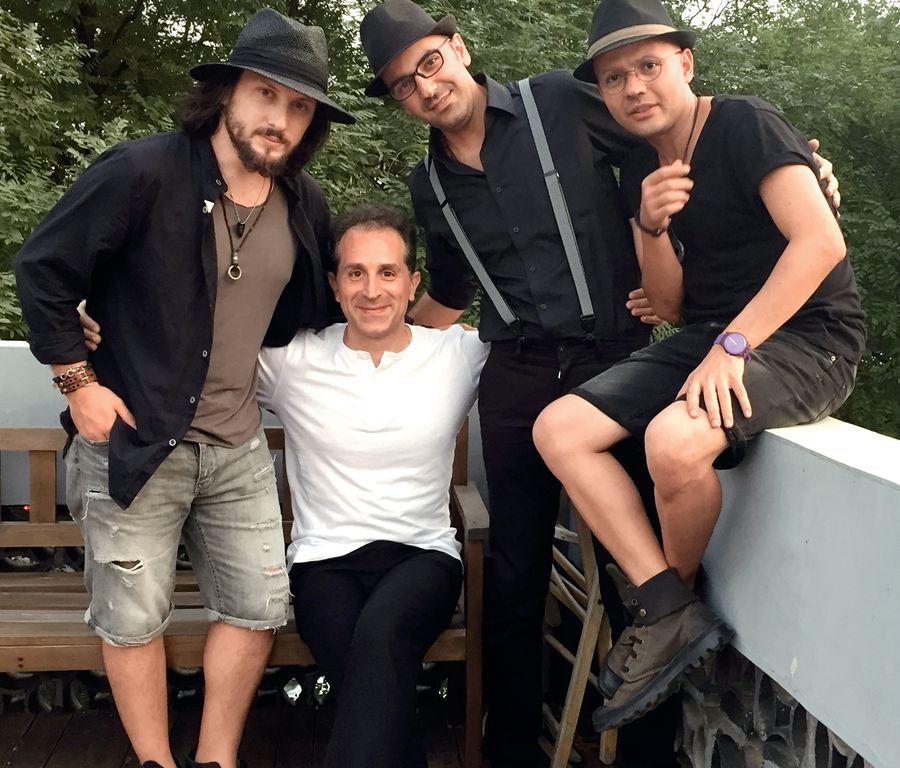
The members comprising RTD all hail from different corners of the historical Silk Road: Turkey, Italy, and Iran.
Massimo, from Rome, plays bass guitar. He came to China for the first time in the mid-1990s. He’s an expert on China, who reads and writes classical Chinese poetry, and likes to practice Chinese calligraphy. The spiritual journey in our Diomira song begins with an Italian passage, which Massimo read from a book.
According to Massimo, RTD is a platform for him to combine music with his ideas of traveling. It represents an ideal journey on a line connecting geographical places which are, in fact, places in the heart. In his own words:
“Sometimes we are not totally aware of these points inside us but, if we wish, we can have the chance to discover them or learn about them better thanks to the presence of others. Perhaps for this reason too, a journey in my understanding, cannot be anything but an adventure shared with other companions. In the specific case of RTD, this is a journey that has brought me from the West to the East on an adventure that reminds me of the ‘Journey to the East’ mentioned by Carl Gustav Jung in his Red Book. For me, a Westerner, the East represents a part of myself that still contains unknown possibilities and unexplored areas. However, the East is not a precise place, there are several gradations of it expressed by different countries and geographical locations such as Turkey, Iran, and Central Asia up to China. This last place is a cultural symbol of the Far East, closer to the place where the sun rises, where we – together with others – can reach a deeper understanding of ourselves and consequently of the world around us.”
Amir, percussionist. While he plays traditional Persian percussion instruments, he enchants the audience with his magical fingers. After five years in China, Amir unfortunately decided to leave. But due to his work, he often travels back to China, and every time he comes back, he goes on stage with us again.
Mahiar, Iranian, guitarist. He is the most hardworking and productive member of RTD. He plays the traditional Iranian instrument setar as well as electro and acoustic guitar, and has the ability to sing in many languages, including Persian, Turkish, Italian, English, Spanish etc.
Cenk is from Bursa, the ancient capital of the Ottoman Empire. He has been living in China for eight years. He plays electronic guitar, and is a fan of the British heavy metal band, Iron Maiden. His solos carry our songs beyond the usual dimensions.
RTD occasionally works with some Chinese musicians. Since music is the second world for all of us, we can only come together when we have time off from our jobs. All of our performances have always been in Beijing. We have had chances to play at places like DDC, Camera Stylo, Caravan, Labas, Sasha, some famous spots in Beijing’s colorful music scene. We had an unforgettable bookstore performance in the Sofar Sounds project last year.
Music — A Language without Boarders
Music is a language that transcends differences and emphasizes the common aspects of humanity. The historical Silk Road provided not only trade of goods but also the musical styles and instruments that go far geographically. Today, our interaction with people along the modern Silk Road is intertwined with each other. There is no need to separate anyway. One example is the well-known folk song Sari Gelin (Yellow Bride) in Anatolia. People are always debating which country it actually belongs, because Azerbaijan, Turkey, and Armenia all claim it as their song.
Why does this matter? Well, we are preparing to sing the different parts of the Sari Gelin song in Turkish, Armenian, Persian, and even Chinese, because we know that music cannot be confined to the boundaries of any one country or language. Music is a universal field that goes beyond ideological obsessions and political boundaries. Music makes long distances shorter, reducing the distance between Rome and Beijing to a few musical notes.
EMRE DEMIR works for China Media Group Turkish Service.




